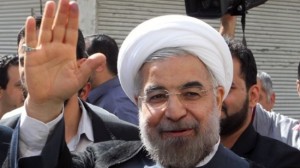 TEHRAN ó†Hassan Rouhaniís surprising victory in the June 14 presidential election has left Iranís conservative political establishment, which dominated Iranian politics for the past decade, wondering what went wrong.
TEHRAN ó†Hassan Rouhaniís surprising victory in the June 14 presidential election has left Iranís conservative political establishment, which dominated Iranian politics for the past decade, wondering what went wrong.Conservatives, known for their adherence to the founding principles of the Islamic Republic, have long contended that they represent the will of the Iranian people and that they are most closely in line with the supreme leaderís wishes.
But that blocís enormous loss in this monthís presidential†election†has cast doubt on those claims, with analysts calling the defeat a rejection of the conservative agenda by an electorate that is demanding a change of course.
The losing candidates themselves have said little about what led to their collective defeat by Rouhani, a cleric who received more votes than the other five candidates combined. But some of their allies, including even the supreme leader, Ayatollah Ali Khamenei, have acknowledged the need for a shift away from revolutionary policies to ones geared more toward pragmatic action.
Iranian politics has become increasingly factionalized in recent years, but divisions within the conservative camp bubbled to the surface in advance of the election as voters signaled their displeasure over Iranís isolation after years of ideologically driven domestic and foreign policies.
ďWe cannot run the country with a single faction while omitting another one,íí Mohammad Reza Bahonar, a conservative lawmaker, said in a televised event last week. He said that the presidencies of Mohammad Khatami, a reformer who governed from 1997 to 2005, and Mahmoud Ahmadinejad, a conservative who was first elected in 2005, had been characterized by extremism. The result this time, he said, ďwas that people voted for the moderates.íí
For his part, Khamenei offered a positive spin on the outcome of the election, emphasizing the high level of voter turnout, even if halfhearted and opposed to the conservatives who support him.
The turnout,†Khamenei said,†ďshows that even people who do not support the system trust it and its elections because they know that a robust Islamic Republic stands like a lion and defends its national interests and dignity.íí
The defeated candidates included some who have been pillars of the conservative establishment, most notably Ali Akbar Velayati, a former foreign minister; Mohsen Rezaei, a former commander of the Islamic Revolutionary Guard Corps; Saeed Jalili, a former top nuclear negotiator; and Mohammad Bagher Ghalibaf, the mayor of Tehran. The group never unified around a single candidate, splintering their base of support.
If conservatives are to recover as a political force, they have to ďmend their relationsíí and ďchange the heavy atmosphere between themselves,íí said Hassan Beheshtipour, an Iranian political analyst. But he said the years ahead may offer some opportunity for redemption.
ďConservatives must support and help Rouhani to solve the countryís problems, because these problems are considered to be the product of the conservative government of the past eight years,íí Beheshtipour said. ďPeople believe that conservative policies caused our current problems.íí
Conservativesí popularity among voters had been in doubt since the turmoil that followed Ahmadinejadís contested reelection victory in 2009, a time when the countryís political establishment backed the president in a showdown against angry reformers.
What appears to have changed since this monthís election is the degree to which some conservatives are also acknowledging the need for an approach rooted less in ideological slogans and more in tune with a restless populace hungry for economic opportunities and renewed prosperity.
Some among the group have been quick to offer criticism and possible remedies for their future participation in Iranian politics.
ďThey failed to assign sufficient importance to the rights of people,íí Ali Mottahari, a member of parliament, said of his fellow conservatives in an interview with the Mehr News Agency. ďThey do not comprehend the realities of our society and instead believe that to keep the system going they can do whatever is necessary, while the basic rule of maintaining the system is to have the trust of society.íí
Another weakness being cited is the conservativesí inability to attract essential voting blocs, including ethnic minorities, women and youths.
Amir Reza Vaez Ashtiani, a member of central council of the Islamic Coalition Party, one of Iranís oldest conservative groups, suggested that the conservatives had become stale and out of touch with younger Iranians, not doing enough to expand their base.
ďIn every election we see the same conservative candidates running and there are no young faces. This is a weakness,Ē said Vaez Ashtiani.
Amir Mohebian, a conservative political analyst, said in an interview with the Fars News Agency that conservatives ďmust clearly and realistically accept their defeatĒ and that any other interpretation of Rouhaniís election was ďsheer self-deception.Ē
ďThis was a victory for the system, no doubt, but not for conservatives,Ē Mohebian said.
By The Washington Post
The Iran Project is not responsible for the content of quoted articles.










